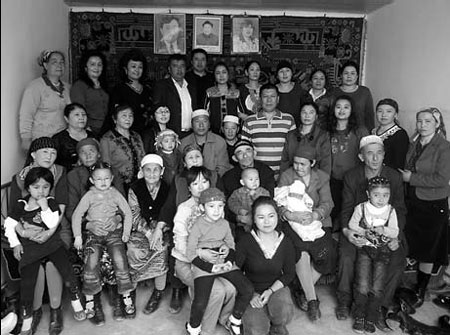
|
CHINA> News
 |
|
Mother of courage and a big, big heart
By Lei Xiaoxun (China Daily)
Updated: 2009-05-04 07:37
 It is not easy for Anipa Alimahong, the "remarkable mother of Xinjiang Uygur autonomous region" title-holder, to get her entire family together for a reunion photo. The family has more than 80 members from six different ethnic groups, namely Kazak, Hui, Han, Uygur, Tartar and Uzbek. Among Anipa's 19 offspring, 9 are her biological children while the other 10 were adopted from 1963 to 1994. Many would say she has achieved a miracle, although she herself does not see that as extraordinary.
"I grew up in a tradition in which everyone must help others; a caring heart is valued most in my family culture," she says, adding that she wishes to help orphans affected by last year's earthquake in Sichuan province. Anipa's story began in 1956, when her family left Mongolia to settle down in Qinghe county, Xinjiang. Life in Xinjiang was far better. The people in Qinghe were kind and treated each other with mutual respect. In the first few years, Anipa's neighbors and friends offered a lot of support to help her find her feet and merge into the local community. Having waded through the difficulties, Anipa felt a strong obligation to fulfill a dream - do something for the people who gave her a new life. In 1963, Anipa's neighbor Yahfu and his wife passed away, leaving behind three children, aged between 14 and 19. Anipa and her husband Abibao took them under their wings. All of them were living on Anipa's husband's meager income, 47 yuan ($7) per month. Food shortage and the lack of daily necessities were also common in the 1960s, Anipa recalls. It was her overwhelming maternal instinct that made Anipa adopt the young orphans. "I couldn't see these three brothers starving to death," she says. Anipa, then only 20, decided to look for a job to help lessen the burden on the family. "I still remember the image of my mom getting up early and going out to hawk yoghurt," says Rahimam, the youngest daughter. "Mom was so small and she carried a huge white plastic bucket full of yoghurt. I can never forget that." From the yoghurt business, Anipa made about 36 yuan every month and the family's situation improved marginally. The hardship continued for 14 years. On a freezing day in 1977, Anipa met 11-year-old Wang Shuzhen, wandering in front of the local hospital with her two brothers. Wang's father died when she was young. Her mother married again. Once she too was dead, Wang's stepfather turned the siblings out. When Anipa took them home, her children covered their noses and ran away. Wang and her siblings gave out a "disgusting smell" and wore "a horrible look", says Anipa. They had not bathed for long and their heads, faces and arms were full of wounds and sores. Anipa cleaned them up and served them delicious food. "I would not have survived if it were not for mother Anipa, chances were we might die in the cold," says Wang, now a middle-aged housewife. Talking of how Anipa saved her life always brings tears to her eyes. Anipa knew adopting all 10 children was going to be difficult, but went about it with great determination. Her youngest daughter Rahimam did not like this adoption spree. "I would hate her so much," she admits. "We were so impoverished that the family frequently ran out of food and we were short of every thing except people." Rahimam says her mother was especially "mean" to her own children. "We scavenged for torn shoes in dustbins. Mom saved all her money for the adopted ones. We would go hungry as my parents always fed their adopted children first." Things looked up slightly as Anipa found a job in a Muslim slaughterhouse. She helped clean the cattle organs. On most occasions, the job had to be done, standing in knee-high cold river water. Anipa contracted severe arthritis as a result; today she is unable to stretch her legs. She earned a small wage and some free meat and cattle organs. "She worked in the slaughterhouse during the day, and cooked till late, preparing the next day's meal," Rahimam says. She doesn't hold grudge against her mother any more. "Now I understand how great my mom is," Rahimam says. "I would like to adopt a child on my own, if I may." The Anipas are now enjoying a happy life as most of the children are well settled in their lives. The Anipa family, however, is still growing. Motivated by their mother's heroic devotion to help others, Anipa's sons and daughters too are involved in philanthropic activities. Some of them have adopted orphans themselves, bringing joy and the security of a happy home in several young lives. (China Daily 05/04/2009 page8) |